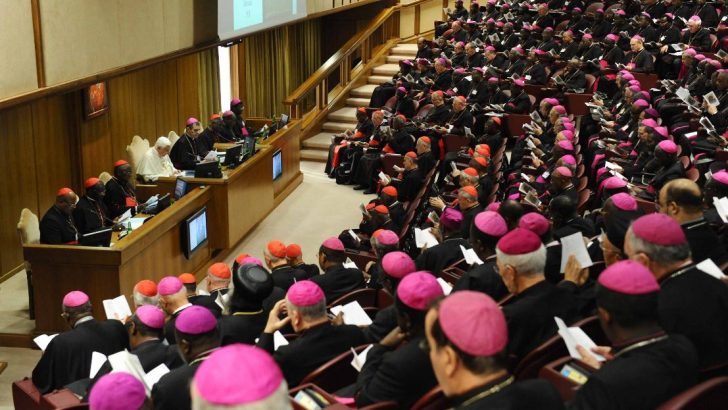Pope in Ireland
Pope Francis wants a living relationship between Rome and the local Churches, writes Greg Daly
It’s one of the many ironies of Pope Francis’ pontificate that the 2014 and 2015 synods of bishops have been criticised by some as rigged exercises, when by all accounts they were the most open and transparent synods the Church has ever seen.
Held every two or three years since 1967, when Blessed Paul VI established the synod with the intention that it be a council of bishops intended to ensure the Church would continue to reap the benefits of the consultative process experienced in the Second Vatican Council, the synods until recently tended to be carefully-managed talking shops rather than instruments of governance, with their agendas and conclusions under tight curial control.
2008 and 2012’s synods on the Word of God and the New Evangelisation were steps in a more open direction, but it was clear by the end of 2013 that the forthcoming two-phase synod was going to be a very different phenomenon.
“It is a new approach that responds to the Pope’s new way of doing things and responds in some ways to the dynamics of the Second Vatican Council,” Archbishop – now Cardinal – Lorenzo Baldisseri told Vaticanista Andrea Tornielli in December 2013. “Francis wants a dynamic and permanent synod, not as a structured entity but as an action, as osmosis between the centre and the periphery. And he wants it to be applied to all issues, in order to get suggestions from local Churches.”
Language
This is very much the language of the late Dominican theologian Yves Congar, who has had an immense influence on the thought of Pope Francis. Fr Congar believed every Church renewal consists of an increase in fidelity to her own calling and a return to the roots of the Church. True reform, to Congar’s mind, often comes from outsiders and those far from the centre of the Church, and can require new structures.
Reforms from on high have little chance of success without the participation of those below, he believed, holding that all true reform is pastoral, and about helping people to be holy, attacking the kind of spiritual worldliness that stops the Church from looking like and acting like Christ.
For those who might worry that the synods on the family have exposed and even exacerbated divisions in the Church, and fear that the upcoming synod on young people may worsen things, it is worth looking to the writings of another inspiration for Pope Francis, the late Fr Romano Guardini.
An Italian-born German priest who died in 1968, Fr Guardini has the distinction of having been a huge influence on both Pope Francis and Pope Benedict XVI, with Francis once having worked on a PhD thesis on the theme of ‘polar opposition’ in Guardini’s writings.
Considering this as something beneficial, Francis told Fr Antonio Spadaro in 2016: “Opposition opens a path, a way forward. Speaking generally, I have to say that I love oppositions. Romano Guardini helped me with his book Der Gegensatz, which was important to me.”
He continued: “He spoke of a polar opposition in which the two opposites are not annulled. One pole does not destroy the other. There is no contradiction and no identity. For him, opposition is resolved at a higher level. In such a solution, however, the polar tension remains. The tension remains; it is not cancelled out. The limits are overcome, not negated. Oppositions are helpful. Human life is structured in an oppositional form. And we see this happening now in the church as well. The tensions are not necessarily resolved and ironed out; they are not like contradictions.”
Guardini, in short, believed contrasting views could work together to generate dynamic growth, and following him, Francis has concluded that ecclesiastical unity should not be something imposed from above and that given time and patience conflict can lead to a deep agreement in unity, even if not in uniformity.
For Pope Francis, such unity is the work of the Holy Spirit, in whom we are called to trust.
In the meantime, though, there’s no harm in open disagreement, he thinks, famously remarking of the Synod Fathers: “I prefer that they yell a few strong words against each other and then embrace, rather than speak against each other in hiding.”


 Greg Daly
Greg Daly